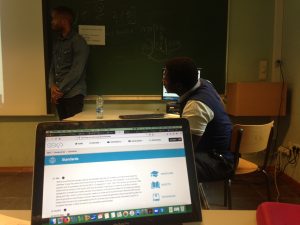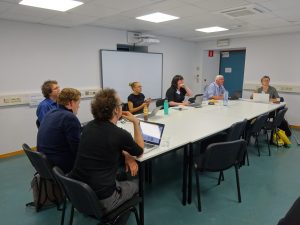This year’s DH (Digital Humanities) Benelux conference was held in the impressive Belgian town of Liège. PARTHENOS had a high profile at the conference with a workshop on the Standardization Survival Kit (SSK), a presentation on its Foresight Study – which investigated how digital research methods, technologies and infrastructures in digital humanities and cultural heritage may develop over the next 5-10 years – and a panel session entitled “Twin Talks – Understanding collaboration in DH”.
Left: Charles Riondet presents the SSK. Right: In the foreground, a participant is learning about standards while, in the background, Lionel Tadjou and Damien Biabiany chair the session.
Standardization Survival Kit
On Wednesday 11 September, PARTHENOS presented the SSK to an interested audience. The SSK is an online tool which focuses on giving researchers access to knowledge around standards by using research scenarios covering all the domains of the Humanities, from literature to heritage science, including history, social sciences, linguistics, etc. The aim of this specific workshop was to jointly develop new scenario’s for the medieval studies community. This way of working is the method that has been applied in the SSK’s development since its inception: through a joint effort by the DH field, for the DH field.
Foresight Study
The next day started with three separate sessions, of which one was entitled “Discussing DH”. This part of the programme consisted of three presentations. One of these presentations focussed on the PARTHENOS Foresight Study and was presented by Sheena Bassett on behalf of the team. This exploratory research did not only consist of a thorough landscape analysis, but also provided recommendations for future interventions to optimise its development. The presentation was well-received. Attendees were mostly eager to learn more about the used methodology and the role of training in shaping the future of DH (which cuts across all the topics).
Twin Talks Panel – hosted by Steven Krauwer and Darja Fišer of CLARIN.
Twin Talks
Since DH Nordic 2019, CLARIN and PARTHENOS have organised two sessions under the title “TwinTalks – Understanding Collaboration in DH”, to explore the way in which collaboration between people with humanities research on one side and technical skills on the other takes place. You can read more about the first session on this website. The second of these sessions was organised during DH Benelux 2019. On Thursday afternoon 12 September, the following panellists joined us at the table: Dr. Emma Clarke (ADAPT RC, Dublin), Merisa Martinez (DH Commons at University Library, Leuven), Klaus Illmayer (Austrian Academy, Vienna) and Steven Claeyssens (Royal Library, Den Haag).
During this session, several issues were highlighted such as: the large extent of tacit knowledge, which results in researchers often not being aware of how exactly they collaborate; the silo mentality in universities; and seeing libraries as a service rather than a source of expertise and collaboration. The issue of marginalised collections also came up, and for example the risk of a research field such as Theatre Studies losing touch with DH developments (and vice versa) as it is – to a large extent – still analogous. The Dutch Royal Library has very positive experiences with researchers bringing their questions to librarians, i.e. the model is collaborative.
In response to the issues above, some solutions were indicated. Firstly, teaching researchers and librarians on what the work of the other group entails, was considered an important step forward. This could help each side to understand better how the other works and which professional roles are involved. Secondly, libraries need to make themselves more visible, especially with respect to their changing role. Thirdly, formalised collaboration agreements may help in setting up more structural relationships. Lastly, PhD students should have some data management training and be required to produce a Data Management Plan. In summary, there were plenty of ideas that Research Infrastructures can help promote and implement
All Conference papers can be accessed via the programme page at: http://2019.dhbenelux.org/program/




